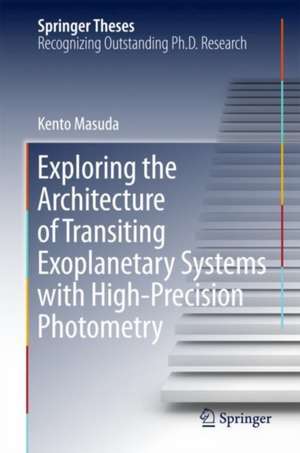Exploring the Architecture of Transiting Exoplanetary Systems with High-Precision Photometry: Springer Theses
Autor Kento Masudaen Limba Engleză Hardback – 15 mar 2018
| Toate formatele și edițiile | Preț | Express |
|---|---|---|
| Paperback (1) | 690.94 lei 6-8 săpt. | |
| Springer Nature Singapore – 29 dec 2018 | 690.94 lei 6-8 săpt. | |
| Hardback (1) | 697.15 lei 6-8 săpt. | |
| Springer Nature Singapore – 15 mar 2018 | 697.15 lei 6-8 săpt. |
Din seria Springer Theses
- 18%
 Preț: 997.88 lei
Preț: 997.88 lei -
 Preț: 389.88 lei
Preț: 389.88 lei - 15%
 Preț: 646.94 lei
Preț: 646.94 lei - 18%
 Preț: 943.43 lei
Preț: 943.43 lei -
 Preț: 399.29 lei
Preț: 399.29 lei - 18%
 Preț: 944.99 lei
Preț: 944.99 lei - 15%
 Preț: 636.80 lei
Preț: 636.80 lei - 18%
 Preț: 941.05 lei
Preț: 941.05 lei - 15%
 Preț: 643.16 lei
Preț: 643.16 lei - 15%
 Preț: 642.68 lei
Preț: 642.68 lei - 18%
 Preț: 1103.62 lei
Preț: 1103.62 lei - 20%
 Preț: 558.83 lei
Preț: 558.83 lei - 18%
 Preț: 1112.30 lei
Preț: 1112.30 lei - 18%
 Preț: 944.19 lei
Preț: 944.19 lei - 18%
 Preț: 1109.92 lei
Preț: 1109.92 lei - 18%
 Preț: 1217.27 lei
Preț: 1217.27 lei - 15%
 Preț: 640.06 lei
Preț: 640.06 lei - 15%
 Preț: 636.45 lei
Preț: 636.45 lei - 15%
 Preț: 640.06 lei
Preț: 640.06 lei - 15%
 Preț: 640.88 lei
Preț: 640.88 lei -
 Preț: 389.70 lei
Preț: 389.70 lei - 20%
 Preț: 563.91 lei
Preț: 563.91 lei -
 Preț: 393.35 lei
Preț: 393.35 lei - 15%
 Preț: 637.93 lei
Preț: 637.93 lei - 15%
 Preț: 641.85 lei
Preț: 641.85 lei - 18%
 Preț: 1225.94 lei
Preț: 1225.94 lei - 20%
 Preț: 551.36 lei
Preț: 551.36 lei - 18%
 Preț: 1229.10 lei
Preț: 1229.10 lei - 15%
 Preț: 639.25 lei
Preț: 639.25 lei - 18%
 Preț: 999.45 lei
Preț: 999.45 lei - 15%
 Preț: 640.06 lei
Preț: 640.06 lei - 18%
 Preț: 1220.45 lei
Preț: 1220.45 lei - 18%
 Preț: 1116.26 lei
Preț: 1116.26 lei - 18%
 Preț: 1110.72 lei
Preț: 1110.72 lei - 18%
 Preț: 1000.87 lei
Preț: 1000.87 lei - 18%
 Preț: 891.17 lei
Preț: 891.17 lei - 15%
 Preț: 640.06 lei
Preț: 640.06 lei - 5%
 Preț: 1154.07 lei
Preț: 1154.07 lei - 15%
 Preț: 635.96 lei
Preț: 635.96 lei - 15%
 Preț: 640.88 lei
Preț: 640.88 lei -
 Preț: 387.20 lei
Preț: 387.20 lei - 18%
 Preț: 1109.92 lei
Preț: 1109.92 lei -
 Preț: 385.25 lei
Preț: 385.25 lei -
 Preț: 385.25 lei
Preț: 385.25 lei - 18%
 Preț: 1112.30 lei
Preț: 1112.30 lei - 18%
 Preț: 999.45 lei
Preț: 999.45 lei -
 Preț: 386.99 lei
Preț: 386.99 lei - 15%
 Preț: 637.13 lei
Preț: 637.13 lei - 20%
 Preț: 554.21 lei
Preț: 554.21 lei - 20%
 Preț: 555.59 lei
Preț: 555.59 lei
Preț: 697.15 lei
Preț vechi: 820.18 lei
-15% Nou
Puncte Express: 1046
Preț estimativ în valută:
133.40€ • 142.65$ • 111.23£
133.40€ • 142.65$ • 111.23£
Carte tipărită la comandă
Livrare economică 18 aprilie-02 mai
Preluare comenzi: 021 569.72.76
Specificații
ISBN-13: 9789811084522
ISBN-10: 9811084521
Pagini: 151
Ilustrații: XIV, 160 p. 52 illus., 36 illus. in color.
Dimensiuni: 155 x 235 mm
Greutate: 0.43 kg
Ediția:1st ed. 2018
Editura: Springer Nature Singapore
Colecția Springer
Seria Springer Theses
Locul publicării:Singapore, Singapore
ISBN-10: 9811084521
Pagini: 151
Ilustrații: XIV, 160 p. 52 illus., 36 illus. in color.
Dimensiuni: 155 x 235 mm
Greutate: 0.43 kg
Ediția:1st ed. 2018
Editura: Springer Nature Singapore
Colecția Springer
Seria Springer Theses
Locul publicării:Singapore, Singapore
Cuprins
Diversity of the Extrasolar Worlds.- Measurements of Stellar Obliquities.- Origin of the Misaligned Hot Jupiters: Nature or Nurture?.- Three-dimensional Stellar Obliquities of HAT-P-7 and Kepler-25 from Joint Analysis of Asteroseismology, Transit Light Curve, and the Rossiter–McLaughlin Effect.- Spin–Orbit Misalignments of Kepler-13Ab and HAT-P-7b from Gravity-Darkened Transit Light Curves.- Probing the Architecture of Hierarchical Multi-Body Systems: Photometric Characterization of the Triply-Eclipsing Triple-Star System KIC 6543674.- Summary and Future Prospects.
Notă biografică
Kento Masuda is a NASA Sagan Postdoctoral Fellow at the Department of Astrophysical Sciences, Princeton University. He received his B.Sc., M.Sc. and Ph.D. in Physics from the University of Tokyo in March 2012, March 2014, and July 2016, respectively. He was awarded the Japan Society for Promotion of Science (JSPS) research fellowship for young scientists, and his research throughout his doctoral program was supported by the JSPS. He has also received a number of prizes and awards: the School of Science Research Award (Master) from the University of Tokyo in 2014, the JSPS Ikushi Prize in 2017, the School of Science Research Award (Ph.D.) from the University of Tokyo in 2017, and the Inoue Research Award for Young Scientists from the Inoue Foundation for Science in 2018.
Textul de pe ultima copertă
This thesis develops and establishes several methods to determine the detailed geometric architecture of transiting exoplanetary systems (planets orbiting around, and periodically passing in front of, stars other than the sun) using high-precision photometric data collected by the Kepler space telescope. It highlights the measurement of stellar obliquity – the tilt of the stellar equator with respect to the planetary orbital plane(s) – and presents methods for more precise obliquity measurements in individual systems of particular interest, as well as for measurements in systems that have been out of reach of previous methods. Such information is useful for investigating the dynamical evolution of the planetary orbit, which is the key to understanding the diverse architecture of exoplanetary systems. The thesis also demonstrates a wide range of unique applications of high-precision photometric data, which expand the capability of future space-based photometry.
Caracteristici
Nominated as an outstanding Ph.D. thesis by the University of Tokyo Department of Physics Presents methodology for the self-consistent joint analysis of photometric and spectroscopic data Discusses unique analyses of the precise photometric light curve combined with orbital dynamics, which appeal to both observers and theorists
